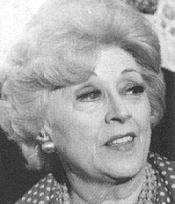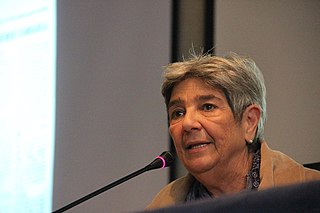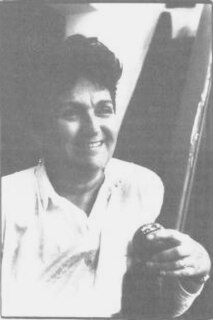Related Research Articles

Jenny María Estrada Ruiz is an Ecuadorian writer and journalist.

Alba Roballo was a Uruguayan lawyer, poet, and politician, who served three consecutive terms from 1958 to 1971 in the Senate of Uruguay and a fourth term in the early 1990s. After graduating with a law degree from the Universidad de la República in Montevideo, she began to write. In 1942, her first book, Se levanta el sol, won first prize from the Ministry of Education. Later she founded two journals, Mujer Batllista and El Pregón. In 1954 she became the first woman to sit on the Montevideo Departmental Council and was elected Senator for the Colorado Party. A prominent Afro-Uruguayan, she was the first woman in South America to serve as a cabinet minister, appointed in 1968; she resigned this post following authoritarian actions by the government. She was a founder of the Frente Amplio in 1971 and though she ran for re-election, that year she was defeated.
Maria Matilde Bianchi Prada was a Uruguayan writer.
Feminism in Argentina is a set of movements aimed at defining, establishing, and defending equal political, economic, and social rights and equal opportunities for women in Argentina. Although some women have been considered precursors—among them Juana Manso and Juana Manuela Gorriti—feminism was introduced to the country as a result of the great European immigration wave that took place in the late 19th and early 20th century. The first feminists did not form a unified movement, but included anarchist and socialist activists, who incorporated women's issues into their revolutionary program, and prestigious freethinker women, who initially fought for access to higher education and, later, legal equality with men. Despite the efforts of the first-wave feminists, Argentine women did not acquire the right to vote until 1947, during Juan Perón's first government. His highly popular wife, Eva, championed women's suffrage and founded and ran the nation's first large-scale female political party, the Female Peronist Party. Although she refused to identify herself as a feminist, Eva Perón is valued for having redefined the role of women in politics.

Anita Blanch was a Spanish-born, Mexican actress, who worked in the Golden Age of Mexican cinema. She was nominated for an Ariel Award from the Mexican Academy of Film three times and won the Best Supporting Actress Award from Diosa de Plata in 1963.

Luz Méndez de la Vega was a Guatemalan feminist writer, journalist, poet, academic and actress. As an academic, she concentrated on researching and rescuing the work of colonial Guatemalan women writers. She was the winner of Guatemala's highest prize for literature, Miguel Ángel Asturias National Literature Prize, and the Chilean Pablo Neruda Medal, among many other literary awards throughout her career.

María Julieta Kirkwood Bañados was a Chilean sociologist, political scientist, university professor and feminist activist. She is considered one of the founders and impellers of the Chilean feminist movement in the 1980s. She is considered the forerunner of Gender studies in Chile.
Amparo Menéndez-Carrión is an author and a scholar specialized in comparative politics and Latin American studies. She received her BA in Political Science at the University of Minnesota and her M.A. and Ph.D in International Relations and Comparative Politics at The Johns Hopkins University School of Advanced International Studies. She was Director General of FLACSO Ecuador for two consecutive terms (1987-1995). Her book La Conquista del Voto en Ecuador was declared by her peers ‘Best Book of the Year in the Social Sciences’. Her most recent book was recipient of the Bartolome Hidalgo award for non-fiction book of 2016 in Uruguay.
Gladys Ethel Parentelli Manzino is a Uruguayan feminist theologian and photographer who has lived in Venezuela since 1969. A representative of Latin American ecofeminism, she was one of three Latin American women appointed by Pope Paul VI as observers at the Second Vatican Council.

Liliana García Sosa is an Uruguayan-Chilean actress with a distinguished film, theatre, and television career in Chile and Uruguay. She has been an honorary cultural associate of the Uruguayan embassy in Chile since the first government of Tabaré Vázquez.
Mercedes Rein was a Uruguayan writer, translator, and dramatist.

Rosa Cobo Bedía is a Spanish feminist, writer, and professor of sociology of gender at the University of A Coruña. She is also the director of the Center for Gender Studies and Feminists at the same university. Her main line of research is feminist theory and the sociology of gender.

Lidia Falcón O'Neill is a Spanish politician and writer. With a degree in law, dramatic art, and journalism, and a PhD in philosophy, she has stood out for her defense of feminism in Spain, especially during the Transition.
Dolores Castillo was a Uruguayan journalist, philosophy professor, and trade union activist.
Adela del Rosario Cabezas de Allwood is a Salvadoran physician, who is considered the second woman to graduate from the doctorate in medicine at the University of El Salvador. Furthermore, Adela de Allwood has published several books throughout her medical career.

Lilián Celiberti is a Uruguayan feminist activist. She became a political prisoner under the military dictatorship and lived in exile in Italy. She is a founding member and coordinator of the feminist collective Cotidiano Mujer, and she is also a leader in Articulación Feminista Marcosur, which promotes the development of a feminist political platform at the regional and global level.

María Angélica Idrobo was an Ecuadorian writer and feminist activist.

Silvia Rodríguez Villamil was an Uruguayan historian, feminist, writer, as well as a political and social activist.

Graciela Sapriza is a Uruguayan historian and educator. Her research focuses on the social, political and cultural participation of Uruguayan women in the 19th and 20th centuries.
Marcelina Almeida, was an Argentine-born Uruguayan writer living in Montevideo, since she was young. Almeida used the pseudonyms Abel and Reine mi bella acclamada to sign her contributions in publications of the time. Her work, Por una fortuna una cruz, is considered the first Uruguayan feminist novel.
References
- ↑ Nuevo Diccionario de la Cultura Uruguaya (in Spanish). Librería Linardi y Risso. 2007.
- 1 2 3 "Falleció ayer Fanny Puyesky" [Fanny Puyesky Died Yesterday]. LaRed21 (in Spanish). 16 October 2010. Retrieved 22 November 2017.
- 1 2 "Pioneras del Bicentenario" (in Spanish). Comisión de Equidad y Genero. March 2011. p. 9. Retrieved 23 November 2017– via issuu.
- ↑ "Fany Puyesky" (in Spanish). autores.uy . Retrieved 23 November 2017.
- ↑ Catálogo Biográfico de Autores Uruguayos[Biographical Catalogue of Uruguayan Authors] (in Spanish). Asociación General de Autores del Uruguay (AGADU). 2000.
- ↑ Ruiz, Marisa (2014). "Algunas consideraciones sobre las mujeres y la democratización en Uruguay" [Some Considerations About Women and Democratization in Uruguay](PDF). Desafios Feministas (in Spanish). 3: 79. Retrieved 23 November 2017.
- 1 2 "La mujer y su dinero – por Fany Puyesky" (in Spanish). Fin de Siglo. 13 October 2011. Retrieved 23 November 2017.
- ↑ Manual para divorciadas. Coleccíon ABC de lector. Stanford University Libraries. 1980. Retrieved 23 November 2017.
- ↑ "Fany Puyesky" (in Spanish). Dramaturgia Uruguaya. Archived from the original on 18 March 2016. Retrieved 23 November 2017.
- ↑ Puyesky, Fany (1999). El acoso sexual (in Spanish). Fundación Cultura Universitaria. ISBN 9789974202504.
- ↑ Puyesky, Fany (2005). Diario de una diosa (in Spanish). Planeta. ISBN 950491442X.